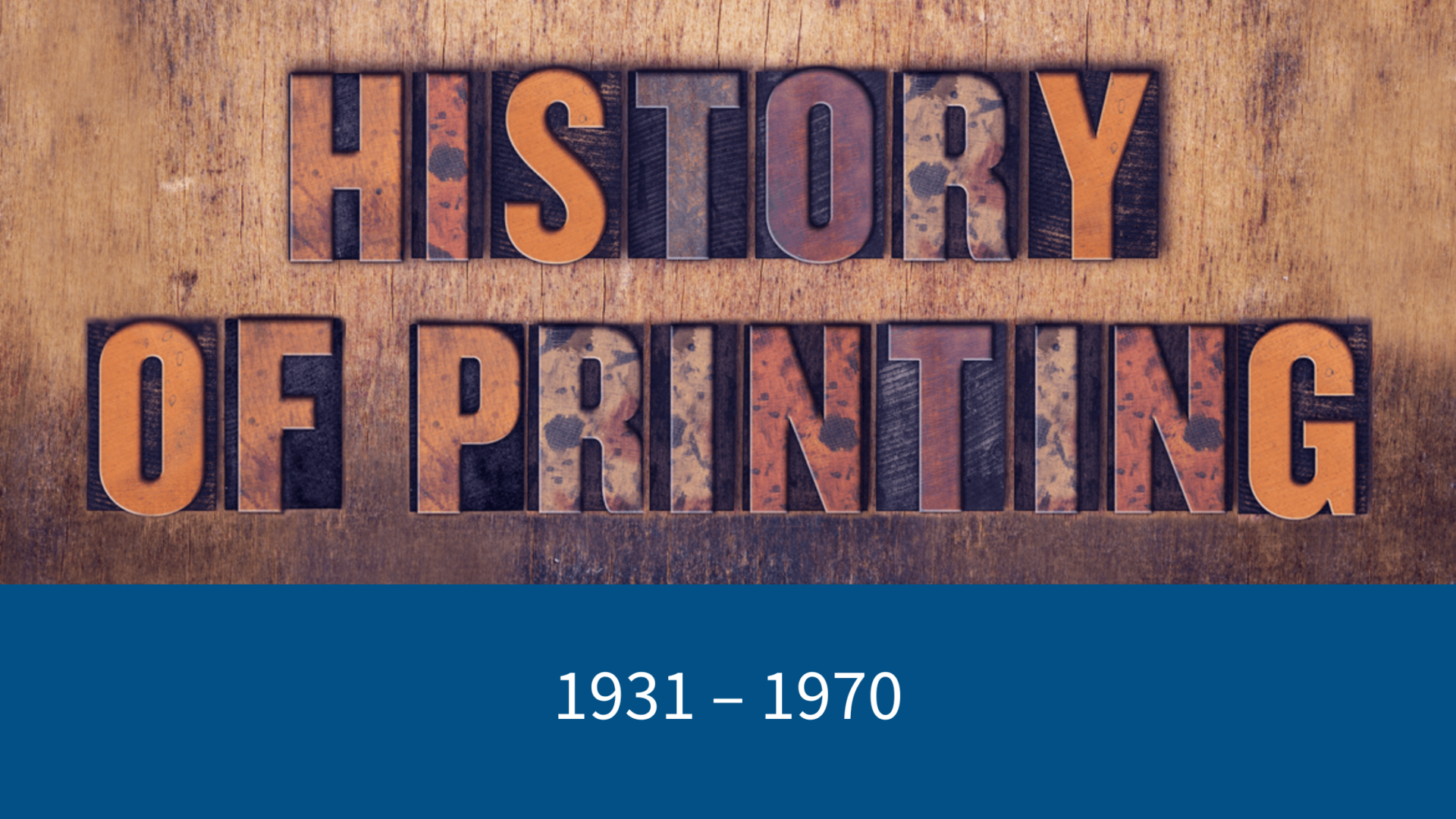History of Printing Timeline: 1931 – 1970
July 15, 2024 | Posted in: PGSF Blogs | Student Resources

Source – printinghistory.org/timeline/
1931
Albert Skira publishes his first livre de peintre, Ovid’s Metamorphoses with etchings by Pablo Picasso in Lausanne, Switzerland.
1932
Times New Roman typeface debuted by the The Times newspaper in London. Commercially released the following year by the Monotype Corporation.
1933
Synthetic rubber printing rollers appear.
The Newspaper Guild established in 1933, affiliated with the Communications Workers of America in 1995.
1934
Pocket Pal: A Graphic Arts Production Handbook, first issued by Grover Daniels of Daniels’ Printing in Everet, Massachusetts.
1935
Penguin paperbacks introduced in Great Britain.
Bookburnings carried out on a large scale in Nazi Germany.
1937
Boston Typothetae renamed Graphic Arts Institute of Massachusetts.
FAG (Fournitures pour les Arts Graphiques) prepress equipment manufacturer established in Switzerland.
The American Imprint Inventory begins under Douglas C. McMurtrie, a Depression-era section the Historical Records Survey to identify and catalogue US imprints produced before 1800 (1890 west of the Mississippi). Suspended in 1942.
1938
Xerography (photocopying) developed by Chester S. Carlson of Queens, New York.
1940
Print, A Quarterly Journal of the Graphic Arts.
1943
Papermaking: The History and Technique of an Ancient Craft by Dard Hunter.
1946
Bookbinding, Its Background and Technique by Edith Diehl.
International Standards Organization (ISO) founded in London.
1947
Graphic Arts Institute of Massachusetts changes name to PIA-New England
Communications Workers of America (CWA) formed.
1949
Phototypesetting developed.
1950s
Photopolymer used for flexography.
Term “prepress” replaces “pre-makeready” used in commercial letterpress, particularly in regard to printing photoengravings.
1951
Inkjet printing developed.
Drupa is the world’s largest printing equipment exhibition first held in Düsseldorf.
1952
The Wonderful World of Insects, first book composed by phototypesetting.
1954
Leonard Baskin establishes his Gehenna Press while a student at the Yale School of Art.
1955
Printing for Pleasure by John Ryder, it popularized the amateur and fine press movement after World War II.
Claire Van Vliet establishes the Janus Press.
Allied Printing Trades Association (formed in 1911) admits five unions: United Papermakers and Paperworkers, the Newspaper Guild, the International Brotherhood of Pulp, Sulphite and Paper Mill Workers, and the Plate Printers, Die Stampers and Engravers.
1957
Association Typographique Internationale (ATypI).
Helvetica typeface introduced.
Dye-sublimation printing developed.
Image scanner (176 pixels) introduced.
Tilon, the first photopolymer-based letterpress plate is developed by Time, Inc.
1958
New Graphic Design an internationally influential journal published in Zurich until 1965.
1959
Xerographic office photocopying introduced.
1960
Tamarind Lithography Workshop is founded by June Wayne in Los Angeles.
1961
IBM “golf ball” typewriter introduced.
Letraset, dry rub-down instant lettering developed.
1962
Ed Ruscha publishes Twentysix Gasoline Stations.
1963
Pantone Color Matching System introduced.
“Printing and the Mind of Man” exhibition in London.
1964
Printing Historical Society founded in London.
Walter Hamady founds his Perishable Press. In 1966, he moves to the University of Wisconsin—Madison.
National Graphical Association formed in Great Britain through the merger of the Typographical Association and the London Typographical Society.
1965
Term “hypertext” coined.
1967
WorldCat founded, an online catalog describing the collections of libraries worldwide.
1967 Carl Dair created Cartier, the first Canadian-designed type face.
1968
Dot matrix printing introduced.
1969
Laser printer invented at Xerox.
Printing with A Handpress published by Lewis and Dorothy Allen.
The Visual Studies Workshop is founded in Rochester, New York.
1970
Water-based ink introduced.
Contributors
Substantive comments and suggestions provided by Abby Bainbridge, George Barnum, Barbara Beeton, Terry Belanger, Charles A. Bigelow, Frank Caserta, Douglas Charles, Sarah Chute, Walter Delaney, Erik Desmyter, Sue Durrell, Paul F. Gehl, Jeffrey D. Groves, John G. Henry, Howard Iron Works Museum, Amelia Hugill-Fontanel, Fritz Klinke, Joel Larson, Keelan Lightfoot, Mathieu Lommen, Se Eum Park, Stan Nelson, Xavier Querol, John Risseeuw, Helen Robinson, Paul Romaine, Frank J. Romano, Walker Rumble, Richard Saunders, Stephen O. Saxe, Ad Stijnman, Katherine Victoria Taylor, Philip Weimerskirch, Eric M. White, Colyn Wohlmut, Woo Sik Yoo, and Corinna Zeltsman.
Sources
Berry, W. Turner and H. Edmund Poole. Annuals of Printing, Blandford 1966
Chappell Warren. A Short History of the Printing Word, Hartley & Marks, 1999
Clair, Colin. A Chronology of Printing, Praeger, 1969
The GATF Encyclopedia of Graphic Communications. Graphic Arts Technical Foundation GATF Press, 1998
Moran, James. Printing Presses, University of California Press, 1973 | ebook
[Republic of Korea] Cultural Heritage Administration
Steinberg, S. H. Five Hundred Years of Printing, Oak Knoll & The British Library, 1996
Stijnman, Ad. Engraving and Etching 1400–2000. A History of the Development of Manual Intaglio Printmaking Processes. ‘t Goy-Houten-London, 2012
Wallis, Lawerence W. A Concise Chronology of Typesetting Developments 1886–1986 , Wynkyn de Worde Society/Lund Humpheries, 1992












